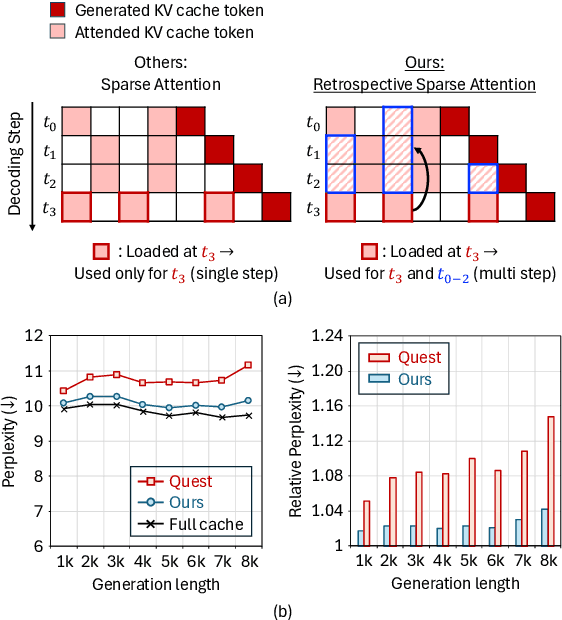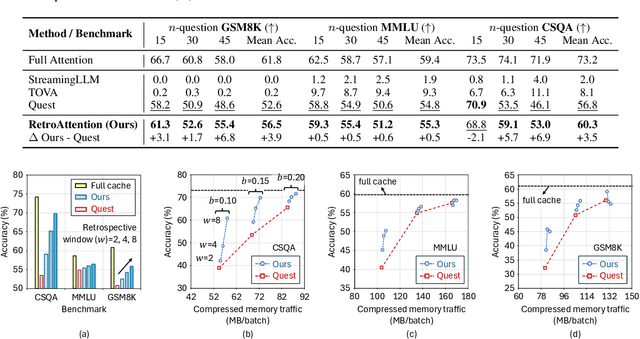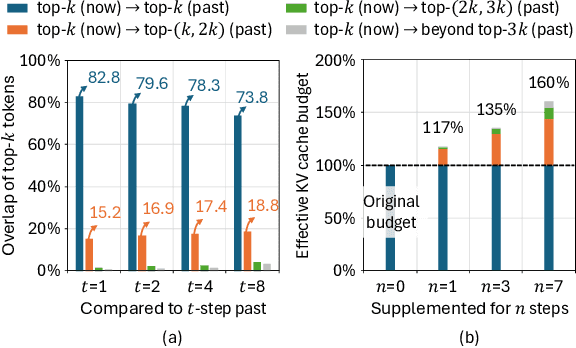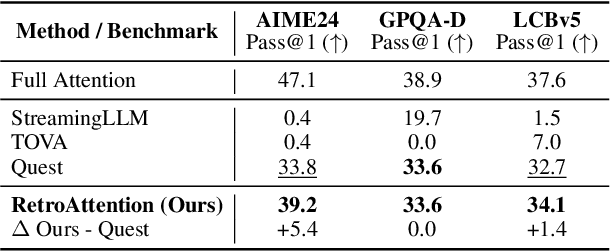Dongwon Jo
Token Sparse Attention: Efficient Long-Context Inference with Interleaved Token Selection
Feb 03, 2026Abstract:The quadratic complexity of attention remains the central bottleneck in long-context inference for large language models. Prior acceleration methods either sparsify the attention map with structured patterns or permanently evict tokens at specific layers, which can retain irrelevant tokens or rely on irreversible early decisions despite the layer-/head-wise dynamics of token importance. In this paper, we propose Token Sparse Attention, a lightweight and dynamic token-level sparsification mechanism that compresses per-head $Q$, $K$, $V$ to a reduced token set during attention and then decompresses the output back to the original sequence, enabling token information to be reconsidered in subsequent layers. Furthermore, Token Sparse Attention exposes a new design point at the intersection of token selection and sparse attention. Our approach is fully compatible with dense attention implementations, including Flash Attention, and can be seamlessly composed with existing sparse attention kernels. Experimental results show that Token Sparse Attention consistently improves accuracy-latency trade-off, achieving up to $\times$3.23 attention speedup at 128K context with less than 1% accuracy degradation. These results demonstrate that dynamic and interleaved token-level sparsification is a complementary and effective strategy for scalable long-context inference.
Retrospective Sparse Attention for Efficient Long-Context Generation
Aug 12, 2025



Abstract:Large Language Models (LLMs) are increasingly deployed in long-context tasks such as reasoning, code generation, and multi-turn dialogue. However, inference over extended contexts is bottlenecked by the Key-Value (KV) cache, whose memory footprint grows linearly with sequence length and dominates latency at each decoding step. While recent KV cache compression methods identify and load important tokens, they focus predominantly on input contexts and fail to address the cumulative attention errors that arise during long decoding. In this paper, we introduce RetroAttention, a novel KV cache update technique that retrospectively revises past attention outputs using newly arrived KV entries from subsequent decoding steps. By maintaining a lightweight output cache, RetroAttention enables past queries to efficiently access more relevant context, while incurring minimal latency overhead. This breaks the fixed-attention-output paradigm and allows continual correction of prior approximations. Extensive experiments on long-generation benchmarks show that RetroAttention consistently outperforms state-of-the-art (SOTA) KV compression methods, increasing effective KV exposure by up to 1.6$\times$ and accuracy by up to 21.9\%.
Reasoning Path Compression: Compressing Generation Trajectories for Efficient LLM Reasoning
May 20, 2025



Abstract:Recent reasoning-focused language models achieve high accuracy by generating lengthy intermediate reasoning paths before producing final answers. While this approach is effective in solving problems that require logical thinking, long reasoning paths significantly increase memory usage and throughput of token generation, limiting the practical deployment of such models. We propose Reasoning Path Compression (RPC), a training-free method that accelerates inference by leveraging the semantic sparsity of reasoning paths. RPC periodically compresses the KV cache by retaining KV cache that receive high importance score, which are computed using a selector window composed of recently generated queries. Experiments show that RPC improves generation throughput of QwQ-32B by up to 1.60$\times$ compared to the inference with full KV cache, with an accuracy drop of 1.2% on the AIME 2024 benchmark. Our findings demonstrate that semantic sparsity in reasoning traces can be effectively exploited for compression, offering a practical path toward efficient deployment of reasoning LLMs. Our code is available at https://github.com/jiwonsong-dev/ReasoningPathCompression.
FastKV: KV Cache Compression for Fast Long-Context Processing with Token-Selective Propagation
Feb 03, 2025Abstract:While large language models (LLMs) excel at handling long-context sequences, they require substantial key-value (KV) caches to store contextual information, which can heavily burden computational efficiency and memory usage. Previous efforts to compress these KV caches primarily focused on reducing memory demands but were limited in enhancing latency. To address this issue, we introduce FastKV, a KV cache compression method designed to enhance latency for long-context sequences. To enhance processing speeds while maintaining accuracy, FastKV adopts a novel Token-Selective Propagation (TSP) approach that retains the full context information in the initial layers of LLMs and selectively propagates only a portion of this information in deeper layers even in the prefill stage. Additionally, FastKV incorporates grouped-query attention (GQA)-aware KV cache compression to exploit the advantages of GQA in both memory and computational efficiency. Our experimental results show that FastKV achieves 2.00$\times$ and 1.40$\times$ improvements in time-to-first-token (TTFT) and throughput, respectively, compared to HeadKV, the state-of-the-art KV cache compression method. Moreover, FastKV successfully maintains accuracy on long-context benchmarks at levels comparable to the baselines. Our code is available at https://github.com/dongwonjo/FastKV.
Mixture of Scales: Memory-Efficient Token-Adaptive Binarization for Large Language Models
Jun 18, 2024



Abstract:Binarization, which converts weight parameters to binary values, has emerged as an effective strategy to reduce the size of large language models (LLMs). However, typical binarization techniques significantly diminish linguistic effectiveness of LLMs. To address this issue, we introduce a novel binarization technique called Mixture of Scales (BinaryMoS). Unlike conventional methods, BinaryMoS employs multiple scaling experts for binary weights, dynamically merging these experts for each token to adaptively generate scaling factors. This token-adaptive approach boosts the representational power of binarized LLMs by enabling contextual adjustments to the values of binary weights. Moreover, because this adaptive process only involves the scaling factors rather than the entire weight matrix, BinaryMoS maintains compression efficiency similar to traditional static binarization methods. Our experimental results reveal that BinaryMoS surpasses conventional binarization techniques in various natural language processing tasks and even outperforms 2-bit quantization methods, all while maintaining similar model size to static binarization techniques.
Squeezing Large-Scale Diffusion Models for Mobile
Jul 03, 2023Abstract:The emergence of diffusion models has greatly broadened the scope of high-fidelity image synthesis, resulting in notable advancements in both practical implementation and academic research. With the active adoption of the model in various real-world applications, the need for on-device deployment has grown considerably. However, deploying large diffusion models such as Stable Diffusion with more than one billion parameters to mobile devices poses distinctive challenges due to the limited computational and memory resources, which may vary according to the device. In this paper, we present the challenges and solutions for deploying Stable Diffusion on mobile devices with TensorFlow Lite framework, which supports both iOS and Android devices. The resulting Mobile Stable Diffusion achieves the inference latency of smaller than 7 seconds for a 512x512 image generation on Android devices with mobile GPUs.
 Add to Chrome
Add to Chrome Add to Firefox
Add to Firefox Add to Edge
Add to Edge